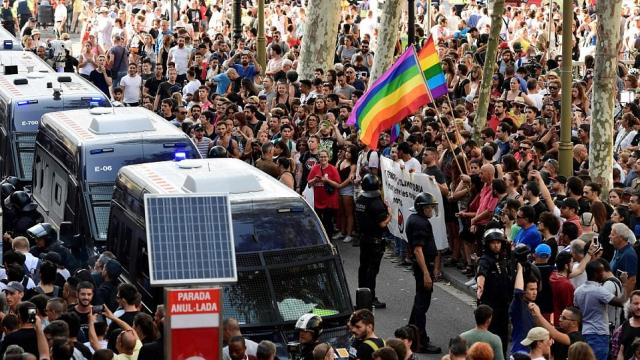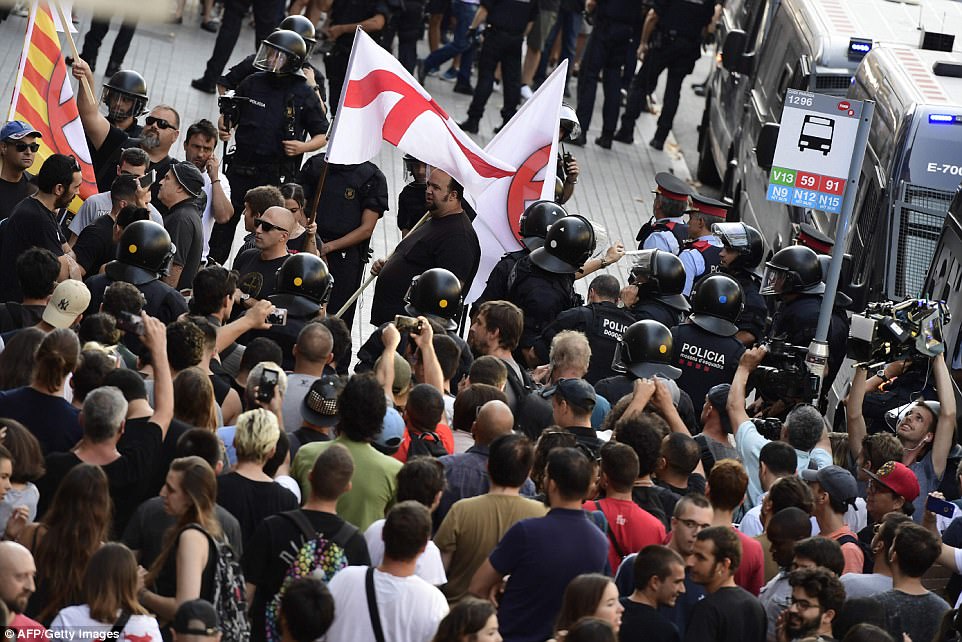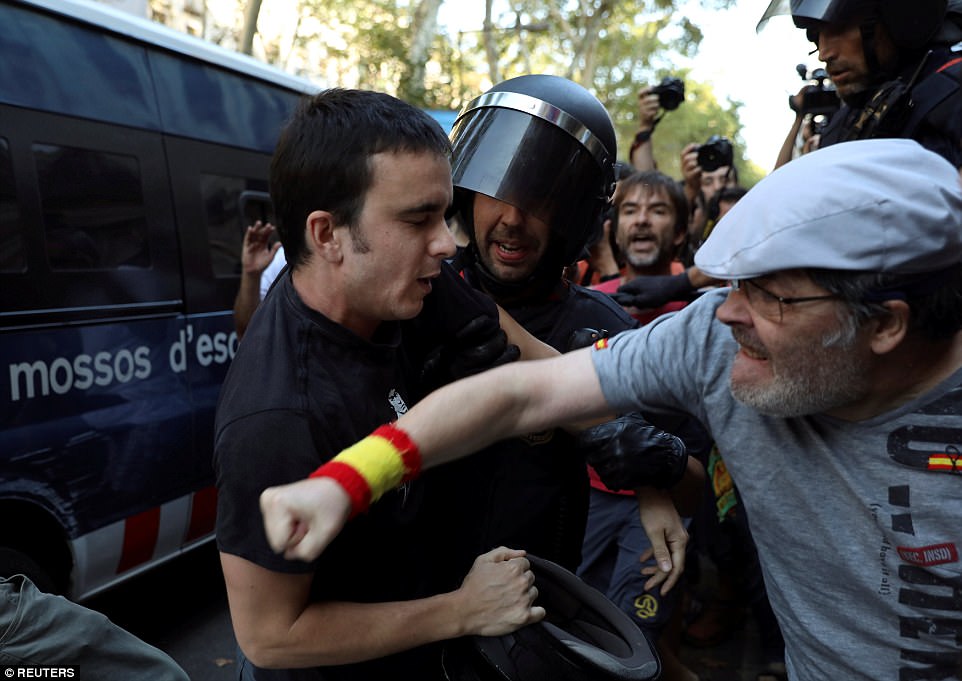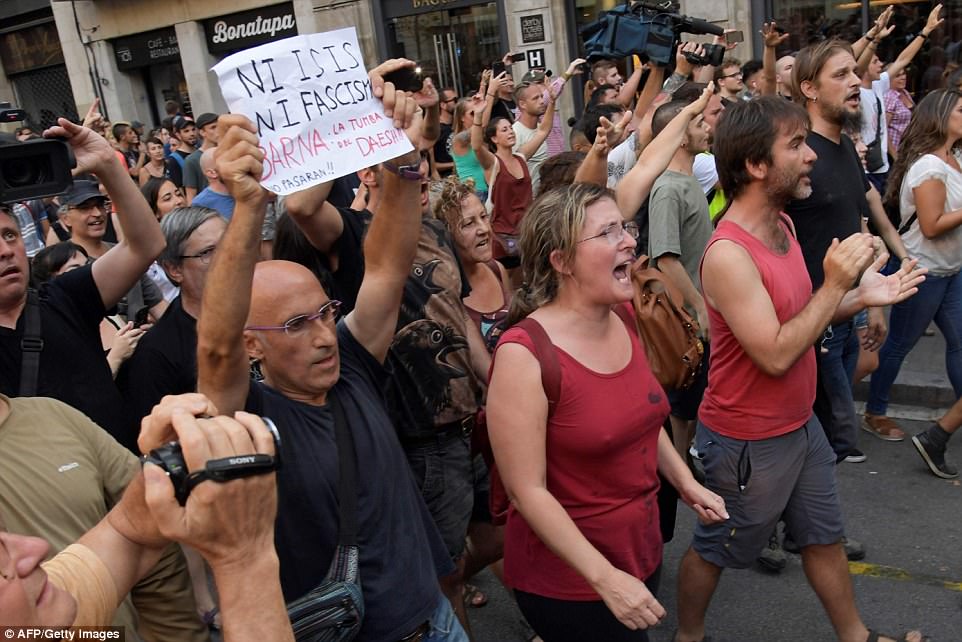
The horrific attack in Barcelona last Thursday, which left 14 dead and injured at least 130 people, took place immediately after a botched preparation in the town of Alcanar, where a member of the terrorist cell accidentally set off butane canisters being prepared for use in the attack on Las Ramblas.
Just one day later, members of the extreme right Spanish group, Falange, took to the streets of Las Ramblas. According to an official statement, their purpose was to protest Islam and the E.U.'s failed immigration policies. Their gathering was met with an immediate counter-protest by members of local anti-fascist groups; things came to a head within a few hours, with members of both groups trading blows until riot police were dispatched on the scene, separating both groups just in time.
For context, the attack on Las Ramblas happened just one week after an undocumented Muslim immigrant plowed a truck into a group of soldiers patrolling the streets of Paris, injuring six. More significantly, the attack came roughly a month after Parisian authorities conducted their biggest "clean-up" operation in which they removed more than 2,000 migrants who had been living on the streets of Paris. Local aid centers had long since failed to keep up with the suffering migrant population, which had been forced to survive with little to no resources for months.
Notable was the absence of any mention of a plan to assist or take care of the relocated population. Why should this alarm people? Because it represents a potential shift in the way that Europe is now approaching the migrant crisis. The continent's seemingly xenophobic, directionless scramble to deal with its refugees isn't entirely a matter of the alt-right. Already, the growing influx of African refugees in Europe is revealing an even greater humanitarian crisis that is about to rear its head.
According to a recent statement by Antonio Tajani, president of the European Parliament: "When people lose hope... they run enormous risks. If we don't confront this soon, we will find ourselves with millions of people on our doorstep within five years. Today we are trying to solve a problem of a few thousand people, but we need to have a strategy for millions of people."
Tajani's statement followed a slew of reports about intercepted migrant boats, published in August. According to Spanish NGOs like SOS Racisme, local authorities are currently dealing with unprecedented numbers of refugees at sea. An editorial published August 9 in the Spanish newspaper El Pais asserted:
"The migratory pressure Spain has experienced during the past several weeks is an increase of such dimensions that it exceeds all measures of surveillance and control... Spain cannot stand alone as the guardian of southern Europe."
All this comes after the highly publicized and widely popular pro-immigration protests that took place in Barcelona in February, where citizens urged the Spanish government to take in more refugees and make good on their promise to fulfil the EU quota established in 2015. In a separate article from El Pais, Syrian refugees reported not wanting to attempt to enter Europe through Spain due to the country's extreme slowness and lack of infrastructure for housing refugees.
According to Wael, a refugee who fled Aleppo for Spain: “In other countries there is financial help for refugees, and there is work. In Spain, after six months, they dump you in the street... This is not a welcoming country, they rob us in the supermarkets and the police do nothing."
In 2016, the NGO Save the Children launched a campaign that highlighted Madrid's failure to live up to its promise of relieving the refugee burden that faced the Greek government. Another protest, which took place in July in Madrid, targeted the Spanish government's failure to uphold its promise of welcoming in more than 20,000 immigrants; instead, it took in barely 2,000 at last count, according to a report by Amnesty International.
In an interesting twist on events, Europe's anti-immigration sentiment seems to now be expanding to include tourism as well, as evidenced by a series of protests that have taken place this year from Venice and Dubrovnik to Mallorca and San Sebastian. Primarily carried out by extreme left-wing groups, the protestors sabotaged rental cars, bikes and tourist buses, and closed off restaurants and other establishments. While none of the protests turned violent, local authorities have been on high alert since July.
For Duncan McCann, a researcher at the New Economics Foundation, the nature of these gatherings indicates that the tensions go beyond simply protecting local economies, which have relied heavily on tourism for decades. "Though tourist numbers have increased, I am not sure they have increased enough in five years to cause this much agitation," McCann said.
"What has really changed? A lot is that politics isn’t out for the ordinary person any more. Until that is addressed I don’t think we’ll see this protest movement subside."
Recent events reveal that Europe's failure to deal with the refugee crisis has led to rising tensions across the continent – with no government able to wash its hands of responsibility. Instead, more outbreaks of violence look imminent, and what places like Spain do to contain the outbursts may open a new front in Europe's social and economic instability.
3 WAYS TO SHOW YOUR SUPPORT
- Log in to post comments



















